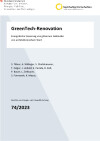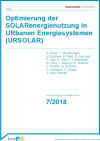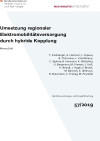Suchergebnisse für "Factsheet: Energietechnologien gestalten, die für alle sinnvoll und nutzbar sind"
GreenTech-Renovation - Energetische Sanierung von gläsernen Gebäuden von architektonischem Wert

Der Schwerpunkt des Projekts GreenTech-Renovation war, innovative Lösungen zur energetischen Sanierung von architektonisch wertvollen Bauten mit hohen Glasanteil zu finden. Dafür wurde ein zukunftsweisendes bauphysikalisches Konzept entwickelt, das den Einsatz alternativer Energieformen beinhaltet. Ein intelligentes Nutzungskonzept kann mit ökologischem und sozialem Engagement die energetischen Sanierungskonzepte verstärken und deren Nachhaltigkeit garantieren. Die 10-R der Kreislaufwirtschaft (Refuse, Rethink, Reduce, Reuse, Repair, Refurbish, Remanufacture, Repurpose, Recycle, Recover) dienen dabei als Leitlinie.
Schriftenreihe
74/2023
S. Tillner, A. Willinger, S. Stockhammer, T. Zelger, J. Leibold, E. Paráda, D. Bell, P. Bauer, L. Zeilbauer, S. Formanek, K. Mauss, B. Lipp, T. Dobra
Herausgeber: BMK
Deutsch, 152 Seiten
Downloads zur Publikation
Optimierung der SOLARenergienutzung in URbanen Energiesystemen (URSOLAR)

URSOLAR stellt EntscheidungsträgerInnen eine Roadmap zur integrierten urbanen Solarenergie-nutzung zur Verfügung. Es wird aufgezeigt, wie Photovoltaik (PV) und Solarthermie angepasst an infrastrukturelle und rechtliche Gegebenheiten in idealtypischen Stadtquartieren aus ökonomischer, ökologischer und sozialer Sicht sowie unter Berücksichtig von Stakeholder-Interessen optimal ge-nutzt werden können.
Schriftenreihe
7/2018
A. Posch, T. Brudermann, M. Buchner, E. Fleiß, D. Geringer, P. Hart, S. Hatzl, T. Kallsperger, G. Lang, T. Mayrold, E. Meißner, C. Reischl, G. Schnedl, S. Seebauer, K. Stöger, A. Würz-Stalder
Herausgeber: BMVIT
Deutsch, 137 Seiten
Downloads zur Publikation
Sanierung PRO!

Entwicklung eines anwendungsorientierten Verfahrensmodells zur bestmöglichen Integration der Interessen der BewohnerInnen, der Interessen des Bauträgers sowie der Zielsetzungen der Wohnbauförderung
Umsetzung regionaler Elektromobilitätsversorgung durch hybride Kopplung (Move2Grid)

Aufbauend auf den Ergebnissen der „Stadt der Zukunft“ Sondierungsprojekte „Smart Exergy Leoben“, und „Energieschwamm Bruck“ soll im gegenständlichen,umsetzungsorientierten Forschungsvorhaben anhand des Beispiels Leoben untersucht werden, wie mit regionalen, erneuerbaren Ressourcen regionale Elektromobilität langfristig versorgt, optimal ins kommunale Verteilernetzsystem integriert und ökonomisch nachhaltig implementiert werden kann.
Schriftenreihe
57/2019
T. Kienberger, A. Hammer, J. Vopava, B. Thormann, L. Kriechbaum, C. Sejkora, R. Hermann, K. Watschka, U. Bergmann, M. Frewein, J. Koß, H. Brandl, J. Vogel, S. Moser, M. Baresch, K. de Bruyn, R. Braunstein, C. Freitag, M. Peyreder
Herausgeber: BMVIT
Deutsch, 172 Seiten
Downloads zur Publikation
Technologie Portrait Energieeffiziente Gebäude (Juli 2002)

Das Technologie Portrait bietet einem Fachpublikum ebenso wie der interessierten Öffentlichkeit ein kompaktes Querschnittsbild des Technologiebereiches Energieeffiziente Gebäude.
Service packages for the ecological renovation of buildings

Services for a comprehensive ecological renovation should comprise advice, design and construction as well as "green" building assessment and innovative financing models. Such services are developed together with companies in the construction business and tested in pilot projects.
Construction Elements and Building Materials for Buildings with High-Level Thermal Insulation - Technology, Building Physics, Ecological Rating, Costs (in Austria)

Catalogue of construction elements for buildings specified according to the passive house standard: proven elements and connections , examined for technical and physical reliability, with evaluated life cycle ecology. Cost assessments (for Austria). Guidelines for building contractors regarding airtightness, etc.
New Conceptions for elderly people in new construction and renewal

Development of a catalogue of criteria for senior-housing and detailed implementation plans of a new building and/or of a reorganization project in Vienna, located in the 16th district; Costs and comparison analysis between "ordinary" New building and/or "ordinary" Reorganization and senior-housing new buildings and/or renewal
High-quality refurbishment - Designing quality standards for the refurbishment of municipal buildings

Designing quality standards for ecological refurbishment (based on E. Panzhauser's proposals, 2001); applying them to characteristic types of buildings systematically selected in diverse municipalities; the achieved results shall serve as good practice examples for future refurbishment and as basis of discussion on subsidy regulations.
SIBAT - Ensuring indoor air quality of buildings - inclusion of toxicological criteria in the assessment of building materials

Development of a pragmatic assessment scheme applicable to building practice for the impact of building products on human health
Formulation of directives for the environmentally conscious choice of upgraded insulation and surface coatings for walls and floors, the basis for the awarding of the international eco-label natureplus

Development and application of an consultancy model to promote sustainable building design

Development of an consultancy model to promote ecologic and economic sustainable building solutions within the planning process. Analysis of the efficiency of guided (integral) meetings with architects, planners, and experts for different items.
Technical status of ventilation systems for buildings

Evaluation of existing ventilation systems in Austria considering technical quality and practicability.
Cooperative Refurbishment

Models for participation of owners and tenants in ecological refurbishment of multi floor buildings
Integrated ecological and energy-oriented refurbishment of service buildings - development of quality criteria and tools within a pilot project (LCC-ECO)

Formulation of a procedure for the general refurbishment of service buildings and development of guidelines to support building owners and facility-managers in each stage of the refurbishment process in order to reach an integrated ecological and energy-oriented refurbishment.
Basic research on fixing elements: drawing up universal design guidelines for high resilience mechanical jointing techniques for insulation products

The objective of this project is to explore mechanical insulant-fixing connections. Unconventional but concrete fixing techniques are the focus of the investigation. The use of insulants as "lost" casing will also be studied in depth.
Energetic building refurbishment in protection zones

Standardized solutions as a help and guideline for building-owners, authorities and companies
Facilitated decision-making procedures for sustainable refurbishment of residential properties

Participation in the refurbishment process: Monitoring of concrete refurbishment projects and development of guidelines to optimise the planning, information and decision-making processes in the course of the refurbishment of residential properties
Ecobuilding - Building Optimisation with Total Quality (TQ) Assessment

The construction, use, and disposal of buildings cause expenses, material flows, energy consumption, and emissions. With intelligent design, construction, management, and marketing, it is possible to reduce environmental burdens and costs, improve building quality, and increase building value.
Practice Guide for Sustainable Building Sanitation and Modernisation within Construction Intents

A checklist considering priority, construction progress and actors is elaborated to serve a future-oriented selection of materials, energy carriers, design and construction within building sanitation, under a deliberate consideration of the involved actors from the construction branch
